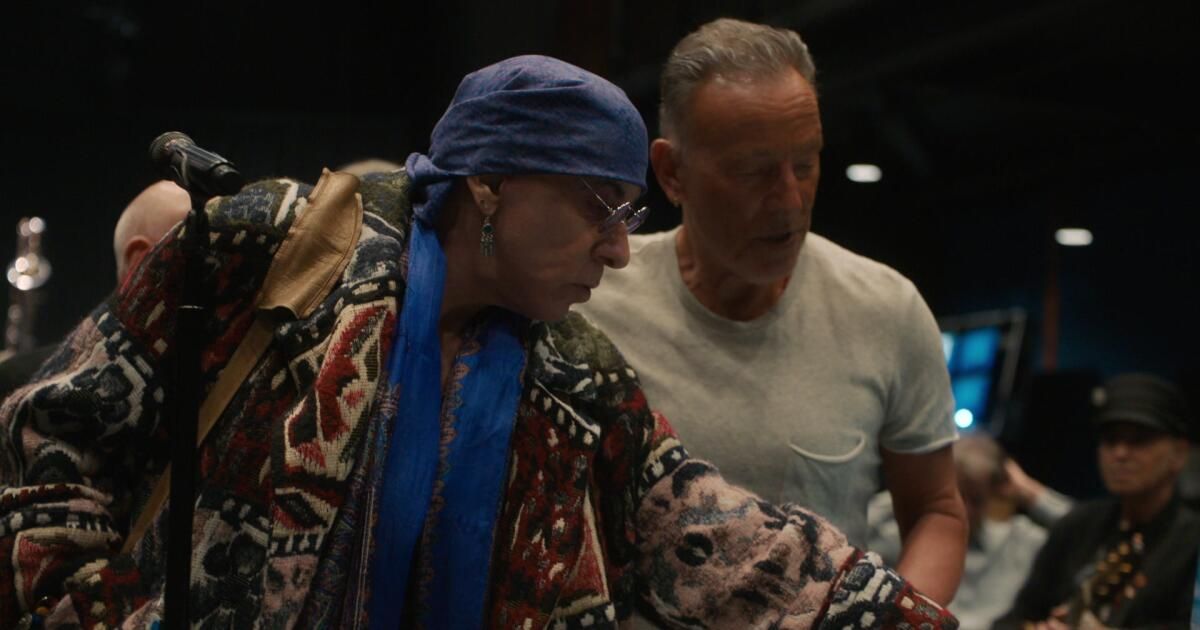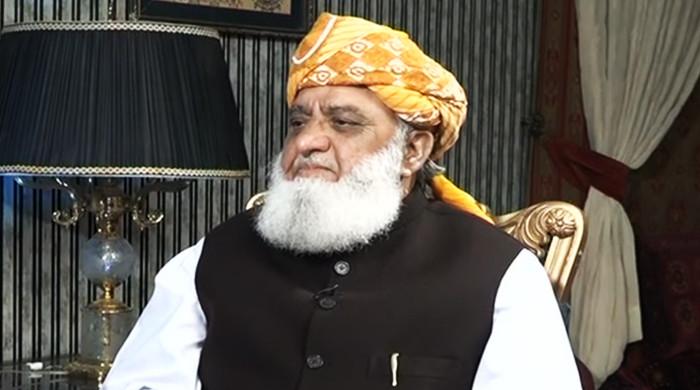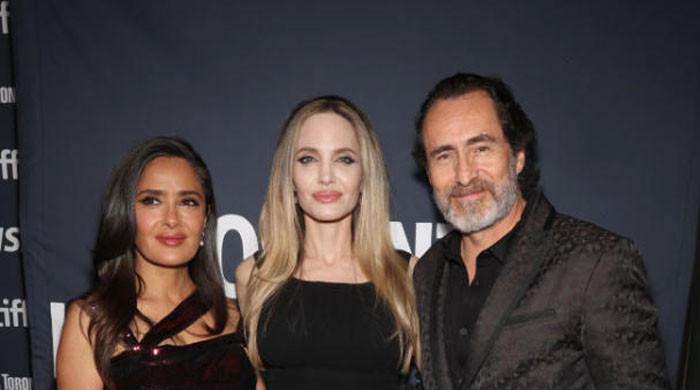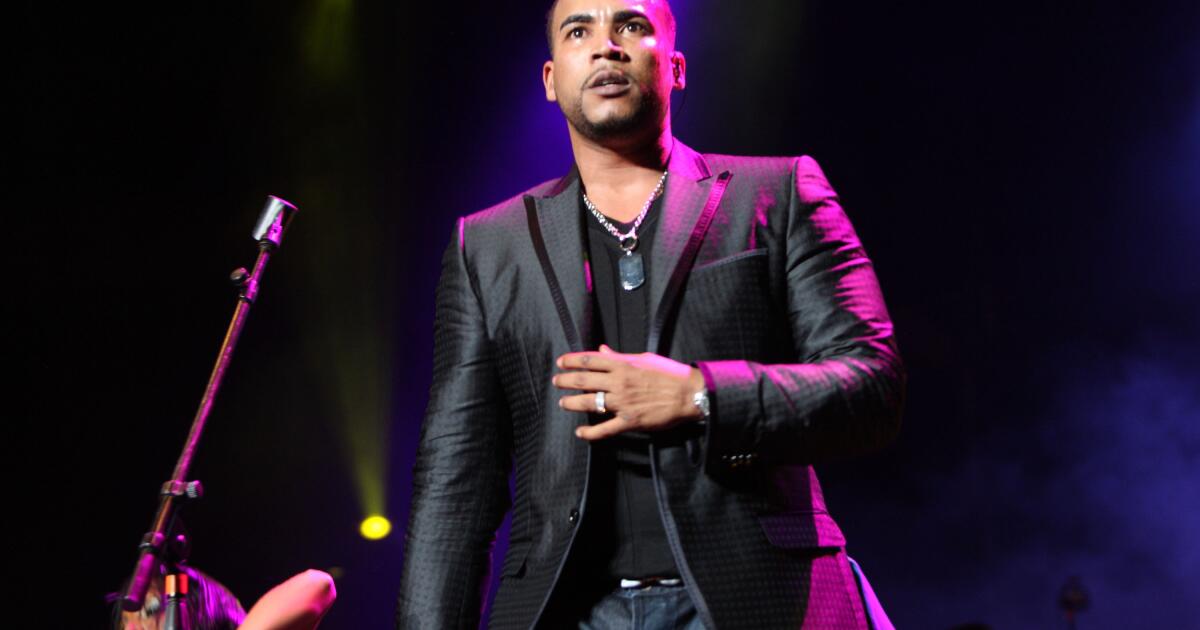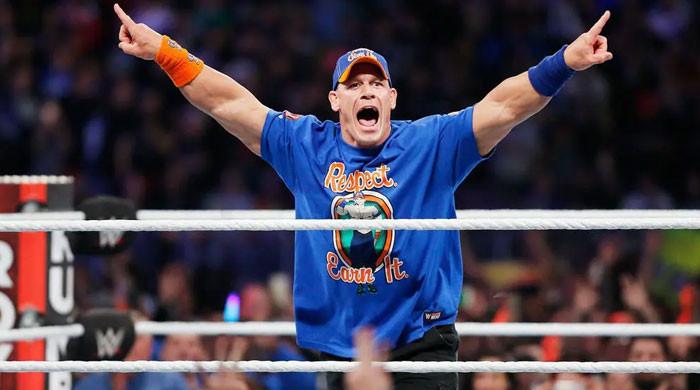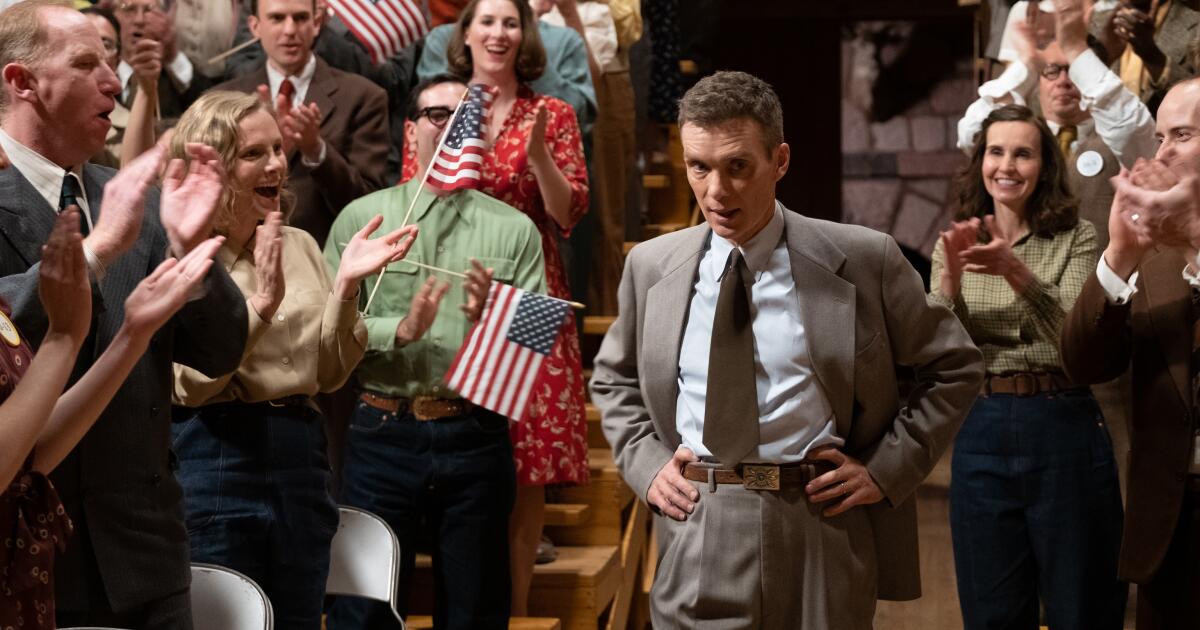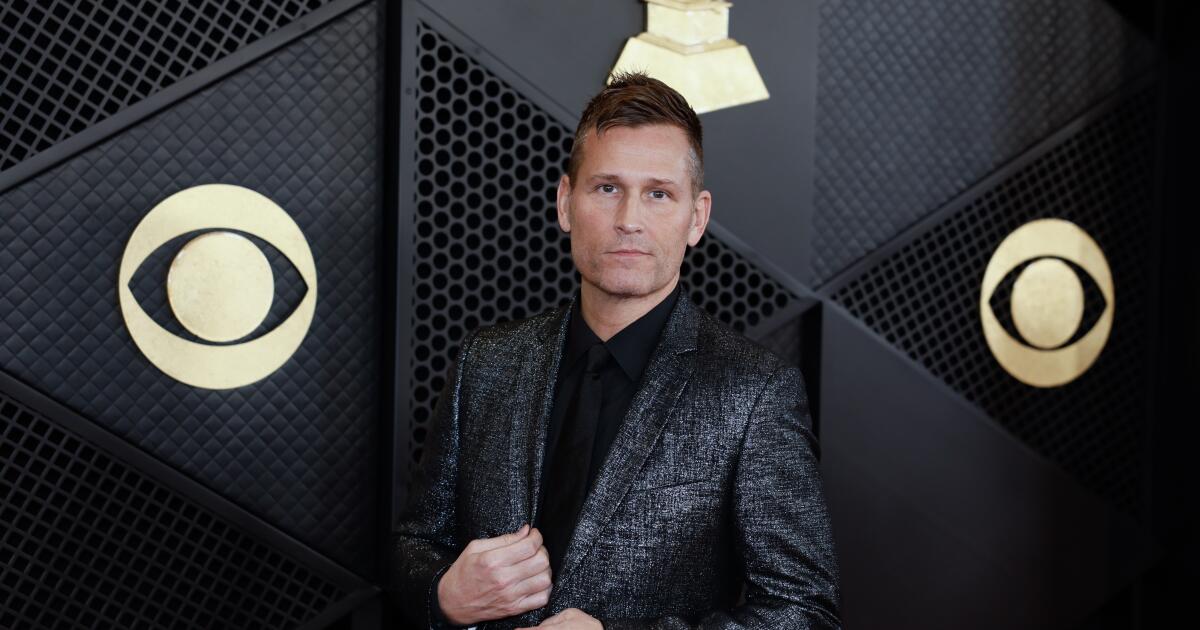Making its world premiere at the Toronto International Film Festival on Sunday is “Road Diary: Bruce Springsteen and the E Street Band,” a close-up look at preparations for the 2023-2024 world tour that reunited the star with his band after an extended hiatus, along with fun concert footage once the tour is underway. After its TIFF premiere, the new film will begin streaming on Hulu and Disney+ on Oct. 25.
Directed by Thom Zimny, who has worked with Springsteen for more than 20 years and won an Emmy for “Springsteen on Broadway,” the film is a portrait of the band as a working unit, bringing in new members, working on new material and setting out to prove they are still a force to be reckoned with. Springsteen himself wrote and narrates throughout the film with astonishing emotional candor.
Zimny and Stevie Van Zandt, one of Springsteen’s closest collaborators for more than 50 years, reunited on a Zoom call last week to discuss the new film. The main concern for many fans will be Springsteen’s health after issues related to a peptic ulcer caused tour dates to be postponed.
According to Van Zandt, Springsteen is “doing remarkably well, he’s completely back to normal. I think we did the right thing, we played it safe, we took some extra time and let him recover. And he’s been fantastic, in great shape.”
Bruce Springsteen in the documentary “Road Diary: Bruce Springsteen and the E Street Band.”
(Hulu)
Thom, were you surprised when you were filming those first rehearsals and the band was going through some tough times? Had you seen the band like that before?
By Thom Zimny: In some ways it was a new story, but there were threads that I recognized from making other films. So it was a surprising moment to see Stevie stop everything and say, “Wait a minute, we're going back. We're going to work on this.”
What I saw was that Stevie was giving details and Bruce was eager to get out on stage. Those two energies were in front of me and as a storyteller, I knew I had a narrative arc in that, that something was happening before my eyes. Everyone was excited to be back, but there's a magic called E Street that I could never say I can describe.
Stevie Van Zandt: If I may, you mentioned the word “struggle,” which is not entirely accurate. What you're witnessing in this film, which is really interesting, is Bruce going back to being a solo artist for three or four years, over a year on Broadway, the “Western Stars” project, and then the whole COVID thing. So what you're seeing is just that transition back after being out of the band for six or seven years, doing solo stuff, which is a completely different mindset.
Fighting is too strong a word. It's just Bruce reorienting himself for what's about to happen as far as the band goes. And then, like [manager] Jon Landau mentions in the film that at some point, it became apparent that Bruce was willing to trust me and the rest of the band to fine-tune things musically. He has to focus on what the story is going to be, what the script is, and how he's going to communicate it. He knows that I can take care of the details of the vocal parts or the horns, the musical details. I know that process very well. I've seen it on every tour, and it was a little more pronounced on this tour because of the time we were away.
Throughout the documentary, Bruce speaks in voiceover about the idea of the story he wants to tell with this set list at this moment. Stevie, is he speaking to you specifically about that concept or is it just a feeling you get from the songs he chooses to play?
From Zandt: This was the most focused track I've seen from him, starting with the album. [2020’s “Letter to You”]He normally takes his time with records and finds his way as he goes. Not this time. This time he came in knowing exactly what he wanted to say. He wrote it in two weeks, which is remarkable. We recorded it in four days. He was incredibly focused from the get-go, and that theme was going to be present throughout the show. Not in a linear way, not quite literally, but it colored the songs quite a bit. There was this theme of mortality very consciously balanced with vitality. The most emotionally centered I’ve seen in his work. And at the same time, we’re closer to the end than the beginning, and what does that mean in terms of living each day? We were very conscious of that. And we talked about that and we wanted to make sure that we came out like a hurricane. We thought that people don’t know what to expect after six or seven years, and, gosh, you know, maybe they’re getting older and who knows what’s going to happen. So we wanted to come out and say: there are no 20-year-olds on the planet who can outdo us.
The film doesn't hesitate to address the fact that we're all getting older. The Rolling Stones, Bob Dylan, Paul McCartney, they're all in their element. 80s And you're still touring quite a bit. Do you feel like there's a precedent for what you're doing with the E Street band as you get older?
From Zandt: There's a remarkable phenomenon going on that someone is going to write about at some point: I think we've changed the concept of chronological time. And I'm not exaggerating. When I was a kid, I didn't know anyone over 60. My grandparents were either gone at 60 or in nursing homes. I personally know 20 80-year-olds who were performing on stage. And the entire British Invasion is turning 80 this year. So something remarkable has happened. Now, I attribute it to rock and roll, but of course I'm biased in that regard. I'm sure medical science has been of some help, but it doesn't really explain how we've gained 20 or 25 years, not in our life expectancy, but in our productive life expectancy… What I'm saying is that as long as the Rolling Stones are around, we're the new kids on the block. So I hope they're gone for good.
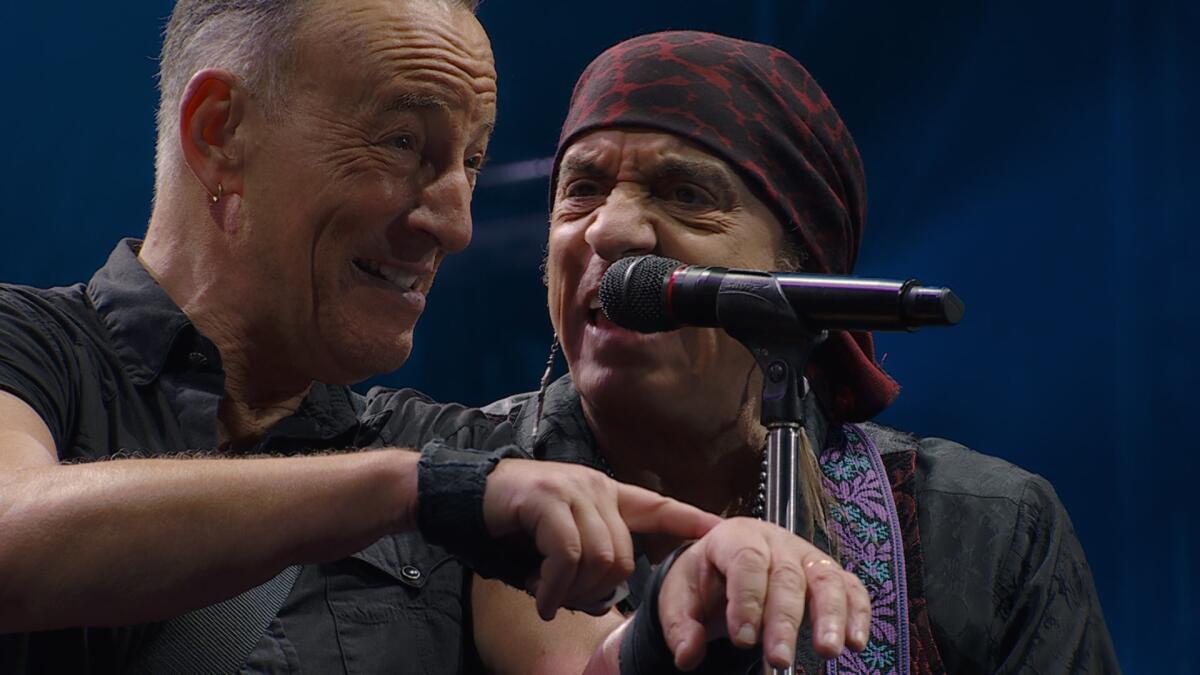
Bruce Springsteen, left, and Stevie Van Zandt in “Road Diary: Bruce Springsteen and the E Street Band.”
(Hulu)
There's a moment in the film where you're performing “Prove It All Night” and Bruce calls you to his microphone and you both trade vocals and it's the kind of ecstatic, transcendent moment that the audience comes to you for. Are you as lost in a moment like that as we are? Or is it pure stagecraft and showbiz dazzle?
From Zandt: We don't really have much stagecraft. [Laughs.] Everything we do has happened spontaneously. We don't really rehearse that much of that stuff. Other than, like I mentioned in the film, “OK, the horns will maybe come down at this point in the song and the singers will come down to the bottom of the stage at this part of the song.” That's it. What Bruce and I do on stage is completely spontaneous. I'm very present in that moment. We go on stage with that same feeling that we always had, when we were 15 years old. Growing up in a renaissance like we did, those standards were set so high by the British Invasion and the early folk-rock people, that '60s music was at such a high level and such a high quality in our minds, I don't think we'll ever get to that. We're still trying to reach that level of excellence. And we haven't really changed that attitude after all these years. So we're very present in that moment, almost trying to win people over in some way. We want to consciously give people the best experience of their lives. We want them to go home saying, “That was the best show I've ever seen.”
We're not there for escapist entertainment, but to offer a service, which Bruce talks about beautifully in Thom's film. We go on stage with a purpose, so that purpose keeps you in the moment the whole time, because every show is different. It's a different audience, a different city. They're seeing it for the first time, for all you know. As far as our attitude, it could be the last show we ever do. Who knows, right? So we make sure we give it 100% every time.
And I think the friendship that we have is what communicates what you're saying. That's what a band is all about. The reason a band is different than a solo act is that interaction. It's the communication of friendship, of family, of group, of team, of gang. It's, ultimately, a communication of community. And that's part of Bruce's themes all the time, is connecting with community. Let's make tonight a community and then let's expand it when everyone leaves this place to make it a bigger community. And I think that's communicated when we're on the same microphone. That friendship, that interaction, is most dramatic in those moments.
Thom, do you recognize moments like that when they happen?
Zimny: Absolutely. I have two things going on. I'm enjoying the moment, but I'm also going back and looking at the material and studying it. I've spent so many hours watching all of this and there's never a moment that repeats itself. There's no structured gag, but there's an energy that I recognize over and over again in the band. And that moment, that spontaneity, is what I, as a fan and a filmmaker, can't put into words. But I know I want my camera to be there to capture those little details. I want to capture a moment that represents a story, a musical conversation that's impossible to explain. Nobody's playing for the camera and nobody's watching me. I'm a guest in a way, after 24 years; they're not thinking about me. So it's a beautiful place to start from as a filmmaker, because in that moment, when Bruce walks up and screams into the microphone, Stevie walks up, and I see that buzz and the people moving, and the energy, that basic language of E Street is something you could study forever as a filmmaker. Because this is a freight train that moves fast.
Stevie, this is an election year and Bruce’s music is heavily used by people from both political parties. Are you surprised, even 40 years later, that the song “Born in the USA” in particular is such a hot political topic?
From Zandt: I think people don’t pay much attention to the lyrics, to be honest. They hear the title and it’s a patriotic title, patriotic in the truest sense of the word. My definition of patriotism. I wrote a song called “I Am a Patriot,” because that word is so often co-opted by the right. Which is not what it means. It means being proud of our American ideals and the fact that we’re still a work in progress. But I think people just hear the title and want to wave the flag a little bit. And it’s perfectly understandable, but we’re certainly not going to allow the far right to use it. Bruce stopped Ronald Reagan from using it. So if he didn’t allow Ronald Reagan to use it, he’s certainly not going to allow this new generation of clowns to use it. I saw a list of about 50 or 60 artists who have told Republicans to stop using their music. I mean, it’s a pretty big list.

